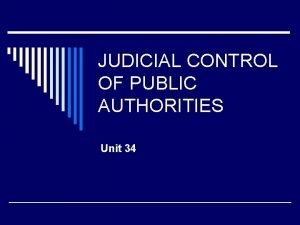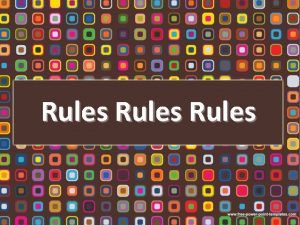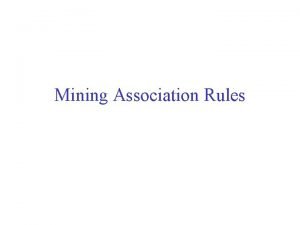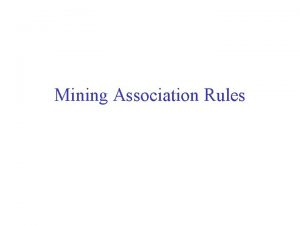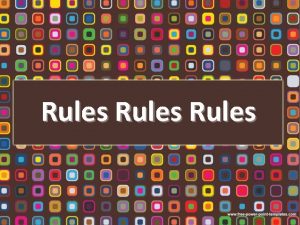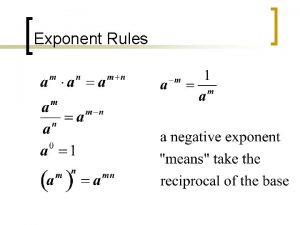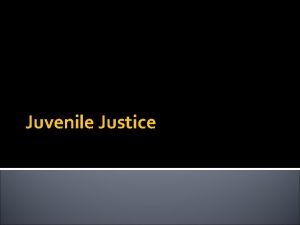NATURAL JUSTICE The rules of natural justice are





![R v Sussex ex parte Mc. Carthy [1924] • A magistrates’ clerk retired with R v Sussex ex parte Mc. Carthy [1924] • A magistrates’ clerk retired with](https://slidetodoc.com/presentation_image_h2/ddc58a07e083ce8d1708db5169683de4/image-6.jpg)
![Metropolitan Properties Co Ltd v Lannon [1969] • The decision of a rent assessment Metropolitan Properties Co Ltd v Lannon [1969] • The decision of a rent assessment](https://slidetodoc.com/presentation_image_h2/ddc58a07e083ce8d1708db5169683de4/image-7.jpg)

![Natural justice applies to anyone who is acting judicially. Ridge v Baldwin [1964] • Natural justice applies to anyone who is acting judicially. Ridge v Baldwin [1964] •](https://slidetodoc.com/presentation_image_h2/ddc58a07e083ce8d1708db5169683de4/image-9.jpg)




![R v Gaming Board ex parte Banaim and Khaida [1970] QB • Held – R v Gaming Board ex parte Banaim and Khaida [1970] QB • Held –](https://slidetodoc.com/presentation_image_h2/ddc58a07e083ce8d1708db5169683de4/image-14.jpg)






![• R v Liverpool Corporation ex parte Liverpool Taxi Fleet Operators Association [1972] • R v Liverpool Corporation ex parte Liverpool Taxi Fleet Operators Association [1972]](https://slidetodoc.com/presentation_image_h2/ddc58a07e083ce8d1708db5169683de4/image-21.jpg)


- Slides: 23

NATURAL JUSTICE Ø The rules of natural justice are the minimum standards of fair decisionmaking, imposed by the common law on persons or bodies who are under a duty to ‘act judicially’. Ø Originally, it was applied to courts of justice but now it extend to any person or body who are deciding on a specific issue(s) affecting the right or interests of individuals where a reasonable citizen would have a legitimate expectation that the decision-making process would be subject to some rules of fair procedure. Ø Thus, the content of natural justice is flexible and variable. Ø What is expected of the decision maker is that his decision is made with due regard for the affected parties’ interests and accordingly be reached without bias and after giving the party/parties the right to put his / their case.

DUTY TO ACT FAIRLY • Is incumbent on every decision maker whose decision will affect the individual interests. • The rules of natural justice only apply when some sort of definite code of procedure must be adopted, however flexible that code may be & however much the decision maker is said to be master of his own procedure. • The rules of natural justice are formulated as • nemo judex in cause sua • no one shall be a judge in his own cause / rule against bias. • audi alteram partem • right to a fair hearing.

1. NEMO JUDEX IN CAUSE SUA – RIGHT TO A FAIR HEARING Ø an adjudicator must not have any direct financial or proprietary interest in the outcome of the proceed. Ø He must not be reasonable suspected, or show a real likelihood of bias.

An adjudicator must not have any direct financial or proprietary interest in the outcome of the proceed • No matter how small the adjudicator’s pecuniary interest may be, no matter how unlikely it is to affect his judgment, he is disqualified from acting & the decision which he has participated will be set aside, unless: • (i) The parties are made fully aware of his interest in the proceedings & clearly waived their right to object to his participation OR • (ii) he is empowered to sit by a special statutory dispensation. • (iii) in a very exceptional circumstances ie all the available adjudicators are affected by a disqualifying interest, in which case they may have to sit as a matter of necessity.

• He must not be reasonable suspected, or show a real likelihood of bias. Ø Likelihood of bias may arise from a number of causes: v membership of an organization v authority that is a party to the proceedings v a witness for a party to the proceedings v personal animosity or friendship towards a party. v Family relationship with a party Ø The strict test of disqualification for personal interest is based on the principle that public confidence in the administration of justice must not be impaired by even the smallest suspicion of judicial impropriety; the rule looks to the appearance of the matter to an outsider.
![R v Sussex ex parte Mc Carthy 1924 A magistrates clerk retired with R v Sussex ex parte Mc. Carthy [1924] • A magistrates’ clerk retired with](https://slidetodoc.com/presentation_image_h2/ddc58a07e083ce8d1708db5169683de4/image-6.jpg)
R v Sussex ex parte Mc. Carthy [1924] • A magistrates’ clerk retired with the bench to consider a verdict in a case of dangerous driving where the defendant was convicted. • Defendant appealed successfully to have the decision quashed on the ground that the clerk belonged to a firm of solicitors acting in a civil proceedings on behalf of the other party. Ø Justice must not only be done but be seen to be done. Ø Test: would a member of the public, looking at the entire situation as a whole, reasonable suspect that a member of the adjudicating body would be biased? Ø In majority of the case, it would suffice if the court were to ask itself whether a reasonable person viewing all the facts would think that there was a substantial possibility of bias.
![Metropolitan Properties Co Ltd v Lannon 1969 The decision of a rent assessment Metropolitan Properties Co Ltd v Lannon [1969] • The decision of a rent assessment](https://slidetodoc.com/presentation_image_h2/ddc58a07e083ce8d1708db5169683de4/image-7.jpg)
Metropolitan Properties Co Ltd v Lannon [1969] • The decision of a rent assessment committee was quashed because the chairman, a solicitor, was acting for his father and other tenants in a separate dispute against the landlord. • Reasonable people would have seen his conduct as unwise and unjudicial. Hannam v Bradford Corporation [1970] • It was held that it was contrary to natural justice for school governors to sit as members of a local education authority’s subcommittee which had to decide whether to confirm a decision of the governors to dismiss a teacher. • This was so even though the relevant governors had been absent from the meeting of governors which took the decision to dismiss.

AUDI ALTERUM PARTEM - RIGHT TO A FAIR HEARING Ø The right to a fair hearing requires at least that nobody be penalized by a decision affecting his rights or legitimate expectations unless he has been given • (a) notice of the case he has to meet & • (b) a fair opportunity to answer the case against him & put his own case. • Cooper v Wandsworth Board of Works (1863) Ø a local authority exercised a statutory power to demolish a house without giving the owner notice or an opportunity to make representations on his own behalf he was awarded damages for trespass, for the authority had failed to observe a rule ‘of universal application and founded on the plainese principles of justice’. Ø The court claimed that it ‘invoked the justice of the common law to supply the omission of the legislature’ which had failed to give the property owner any right to be heard.
![Natural justice applies to anyone who is acting judicially Ridge v Baldwin 1964 Natural justice applies to anyone who is acting judicially. Ridge v Baldwin [1964] •](https://slidetodoc.com/presentation_image_h2/ddc58a07e083ce8d1708db5169683de4/image-9.jpg)
Natural justice applies to anyone who is acting judicially. Ridge v Baldwin [1964] • Chief Constable of Brighton held his office where under the statutory regulation, he may only be removed on grounds of neglect of duty or inability. • He may not be dismissed in the absence of notification of the charge and an opportunity to be heard in his defence. • The duty to act judicially could be inferred from the nature of the decision to be taken and was not dependent on the nature of the decision-making body. • Since Ridge v Baldwin, the general trend is to extend the application of the rules of natural justice to any decision-maker who determine questions affecting the rights or legitimate expectations of individuals. R v Hull Prison Board of Visitors [1978] • Court of Appeal held that prisoners appearing before the Board of Visitors to answer serious disciplinary charges which could result in severe punishment had the right to a proper hearing.

Ø Natural justice is not just limited to decisions depriving citizens of existing rights. Ø Dicta suggest that a citizen has a legitimate expectation that his application for a discretionary benefit such as a license or permit will not be refused without a chance for him to put his case then he is entitled to some sort of hearing. Ø Nonetheless, this may be a case where the rule applicable is “duty to act fairly” which is more fluid and less formal than a duty to observe the rules of natural justice.

Today, it can be assumed that the rules of natural justice will apply in the following situations: Ø Where the decision-making body is a court or tribunal. Ø Where the decision-making body has as its function the holding and bearing of inquiries, or the determination of disputes between the parties. Ø Where a decision-making body is required to determine questions of law or fact in individual cases & its decisions will have a direct impact on the interests of the individuals concerned. Ø When a decision making body is vested with discretionary powers in the exercise of those powers will take a decision seriously impinging on individual rights and expectations. Today, this may fall under a duty to act fairly.

Note: Ø when a body conducts an investigation but has no power to decide, providing that the investigation is truly only a preliminary fact-finding exercise and there are no circumstances to suggest that it would be unfair to prevent the aggrieved individual putting his case at this stage. Ø nonetheless, duty to act fairly will attach to such bodies. Ø So, the person who is faced with adverse imputations is entitled to the opportunity to reply. ie when a person’s rights or interests is affected. Ø The requirement of ‘fairness’ would depend on the facts of each case. Ø The duty to act fairly in such circumstances is a duty not to misuse the discretionary powers vested in the investigating body, not a duty to attempt to achieve a fair procedure.

What is fair hearing? Ø When a person has a right to a hearing, he must • Know what evidence has been given • What statements made against him • Be given a fair opportunity to correct or contradict the statements made against him. Ø There is no fixed rule that the right to be heard must be done orally. In some situation, it can also be done in writing. Ø Nonetheless, there is a rebuttable presumption in favour of the duty to afford an oral hearing if one is requested. Ø All relevant information, including information gathered by the decision maker on his own initiative or as a result of his own expertise or consideration of the case, must be disclosed to persons likely to be affected by its concealment, except when full disclosure may injure the individual affected or the public interest.
![R v Gaming Board ex parte Banaim and Khaida 1970 QB Held R v Gaming Board ex parte Banaim and Khaida [1970] QB • Held –](https://slidetodoc.com/presentation_image_h2/ddc58a07e083ce8d1708db5169683de4/image-14.jpg)
R v Gaming Board ex parte Banaim and Khaida [1970] QB • Held – the gaming board was not required to disclose its sources of information suggesting that applicants for gaming licenses had underworld connections. R v Secretary of State ex parte Hosenball [1977] WLR Ø An American journalist sought to have her deportation order quashed on grounds that his presence in UK was not prejudicial to national security. Ø One of the judges said that this was because of the security of the country. Ø Hence, Mr Hosenball was deported despite the fact that when he was afforded an opportunity of appearing before a panel advising the Home Secretary on his decision to deport, he was given inadequate information on which to answer the general charge against him.

Ø In general, whenever an oral hearing is granted, parties must be allowed to call witness and make submission. Ø they must have a fair chance to put their case and Ø an adjournment of the hearing should be granted if necessary to prevent a party being taken by surprise, but where there a large number of parties (as in a public inquiry), the prejudice to one party must be weighed against the inconvenience to everyone else. Ø Cross- examination of witness should usually not be prevented & hearsay evidence should not be allowed if it results in a person being effectively disabled from answering the points made against him in the hearsay testimony. Ø There are no hard and fast rules either on cross-examination or hearsay. Ø The main point here is that the nature of the decision and process challenged and whether at the end of the day, the persons affected did have a proper opportunity to put their case.

• Legal representation Ø It is said that a party who is entitled to be heard is prima facie entitled to be legally represented. Ø The number of circumstances in which the implied right can be excluded makes it more accurate to say that there is probably a right to be legally represented when a fair hearing is not possible without a legal representation. Ø The more that a person affected has at stake and the more severe the potential sanction the more likely it is that legal representation may become a right enforced by the rules of natural justice.

Ø Sometime, there is an oral hearing conducted by a small committee or tribunal but the decision is made by a larger body. Ø the general rule : he who decides must also hear. Ø This requires that those who listen to the evidence and make recommendations must deliver to the deciding body an adequate report on which the body can discharge its obligation to hear as well as decide. Ø The stringency of this requirement would depend on the nature of the decision-making process under review. Ø The more closely it resembles a proceeding in a court, the most strictly the rule will apply.

Natural justice is not intended to be a precise and uniform code of procedure. What the court seek to enforce is substantial justice.

Duty to act fairly Ø Some are of the opinion that duty to act fairly is not rationally distinguishable from the duty to observe the rules of natural justice. Ø Judges sometimes uses the terminology interchangeably. Ø It has been suggested that although in some situation, there is no duty to apply the rule of natural justice, yet the decision maker are under the duty to act fairly. Ø The duty to act fairly prohibits the decision maker from acting capriciously.

This usually applies in the following area: I. in the area that affects a large group as opposed to individuals. II. Part and parcel of everyday administration. III. Made by bodies which are so different in form and function from those usually subjected to natural justice in that the court would be happier if flexible notions of fairness rather then stretching the rule of natural justice even further.
![R v Liverpool Corporation ex parte Liverpool Taxi Fleet Operators Association 1972 • R v Liverpool Corporation ex parte Liverpool Taxi Fleet Operators Association [1972]](https://slidetodoc.com/presentation_image_h2/ddc58a07e083ce8d1708db5169683de4/image-21.jpg)
• R v Liverpool Corporation ex parte Liverpool Taxi Fleet Operators Association [1972] Ø The town clerk of Liverpool assured the bodies representing taxi drivers that no increase in the number of taxi licenses would be made without consulting them. Ø The sub-committee of the council recommended gradual increase after hearing representations from lawyers representing the taxi drivers. Ø An undertaking was given in the council that there will be no increase until the legislation is passed. Ø The council was then advised that this restriction acted as an improper fetter to their discretion and the numbers of taxi licenses increased. Court of Appeal held: although the council was exercising an administrative function in determining the number of taxi-licenses to be allocated in the city, the court shall not hesitate to intervene in a suitable case in ensuring fairness.

Ø This example shows that where ‘the duty to act fairly’ was preferred to the rules of natural justice as a tool of judicial control. Ø Example of decision-making process which are so far removed from where the rule of natural justice would apply. Ø They are decisions taken in a context where the effect of requiring fairness to one group or individual must be considered in the scope of exercising administrative duty.

ADMINISTRATIVE LAW OF MALAYSIA AND SINGAPORE MP JAIN UPDATED BY DR DAMIEN J. CRIMEAN LEXISNEXIS 3 RD EDITION
 Mikael ferm
Mikael ferm Rules of natural justice
Rules of natural justice Hình ảnh bộ gõ cơ thể búng tay
Hình ảnh bộ gõ cơ thể búng tay Slidetodoc
Slidetodoc Bổ thể
Bổ thể Tỉ lệ cơ thể trẻ em
Tỉ lệ cơ thể trẻ em Chó sói
Chó sói Glasgow thang điểm
Glasgow thang điểm Hát lên người ơi
Hát lên người ơi Các môn thể thao bắt đầu bằng tiếng chạy
Các môn thể thao bắt đầu bằng tiếng chạy Thế nào là hệ số cao nhất
Thế nào là hệ số cao nhất Các châu lục và đại dương trên thế giới
Các châu lục và đại dương trên thế giới Công thức tiính động năng
Công thức tiính động năng Trời xanh đây là của chúng ta thể thơ
Trời xanh đây là của chúng ta thể thơ Mật thư tọa độ 5x5
Mật thư tọa độ 5x5 Làm thế nào để 102-1=99
Làm thế nào để 102-1=99 Phản ứng thế ankan
Phản ứng thế ankan Các châu lục và đại dương trên thế giới
Các châu lục và đại dương trên thế giới Thể thơ truyền thống
Thể thơ truyền thống Quá trình desamine hóa có thể tạo ra
Quá trình desamine hóa có thể tạo ra Một số thể thơ truyền thống
Một số thể thơ truyền thống Bàn tay mà dây bẩn
Bàn tay mà dây bẩn Vẽ hình chiếu vuông góc của vật thể sau
Vẽ hình chiếu vuông góc của vật thể sau Nguyên nhân của sự mỏi cơ sinh 8
Nguyên nhân của sự mỏi cơ sinh 8

